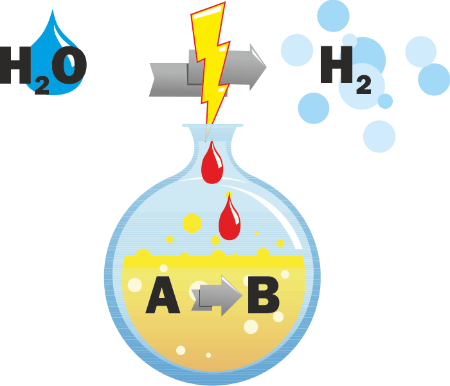TP1 – Electrocatalysts for low-overpotential HMF and alcohol oxidation. From catalyst development to flow-through micro-electrolyzers
In electrochemical water splitting the anode reaction of the electrochemical hydrogen evolution reaction (HER) is the oxygen evolution reaction (OER), which is the energetic bottleneck of the overall water electrolysis process. The formed O₂ has only little economical value, and hence, the portion of energy wasted in the OER should better be incorporated into oxidative transformations which are of general and technical interest.
In the framework of the project UNODE we will investigate model reactions for the generation of value-added products at the anode, which will be modified with selected catalyst materials. We suggest the application of transition metal oxides, mixtures of transition metal oxides, metal-metalloid (B, P) alloys supported on high-surface area support materials as electrocatalysts for alternative anode reactions including but not limited to the alcohol oxidation reaction starting from ethanol and increasing the complexity of the alcohol to glycerol. The aim is on the one hand to discover suitable unusual anode reactions with the inherent capability to provide current densities as required for the HER at the cathode under close to industrial conditions. On the other hand, it is of utmost importance to control the selectivity towards mainly one valuable product and especially avoiding total oxidation to CO₂. Selectivity will be tuned by catalyst assembly, localization of different catalysts in close proximity, multi-metal solid solution materials, control of diffusion, local pH value, electrolyte etc. Moreover, promising anode reactions also from the consortium will be implemented into small flow-through electrolyzer devices in order to evaluate catalytic activity and selectivity, product spectrum and unwanted side reactions by in-line analysis (HPLC, GC, DEMS). Additionally, the same reactions will be in-depth evaluated with operando electrochemistry spectroscopy measurements such as electrochemistry/ATR-FTIR spectroscopy and electrochemistry/Raman spectroscopy. Local electrochemical techniques such as scanning electrochemical microscopy (SECM), scanning electrochemical cell microscopy (SECCM), scanning droplet cell (SDC) measurements also under exclusion of water and oxygen in a glovebox will be made available in the consortium.
Schuhmann, Wolfgang, Prof. Dr., born 10.10.1956, German; Schu929
Analytical Chemistry – Center for Electrochemical Sciences (CES); Faculty of Chemistry and Biochemistry; Ruhr University Bochum, Universitätsstr. 150, D-44780 Bochum, Germany
Tel.: +49 (0)234 3226200; Email: wolfgang.schuhmann@rub.de

 UNODE- DFG Forschergruppe 2982
UNODE- DFG Forschergruppe 2982